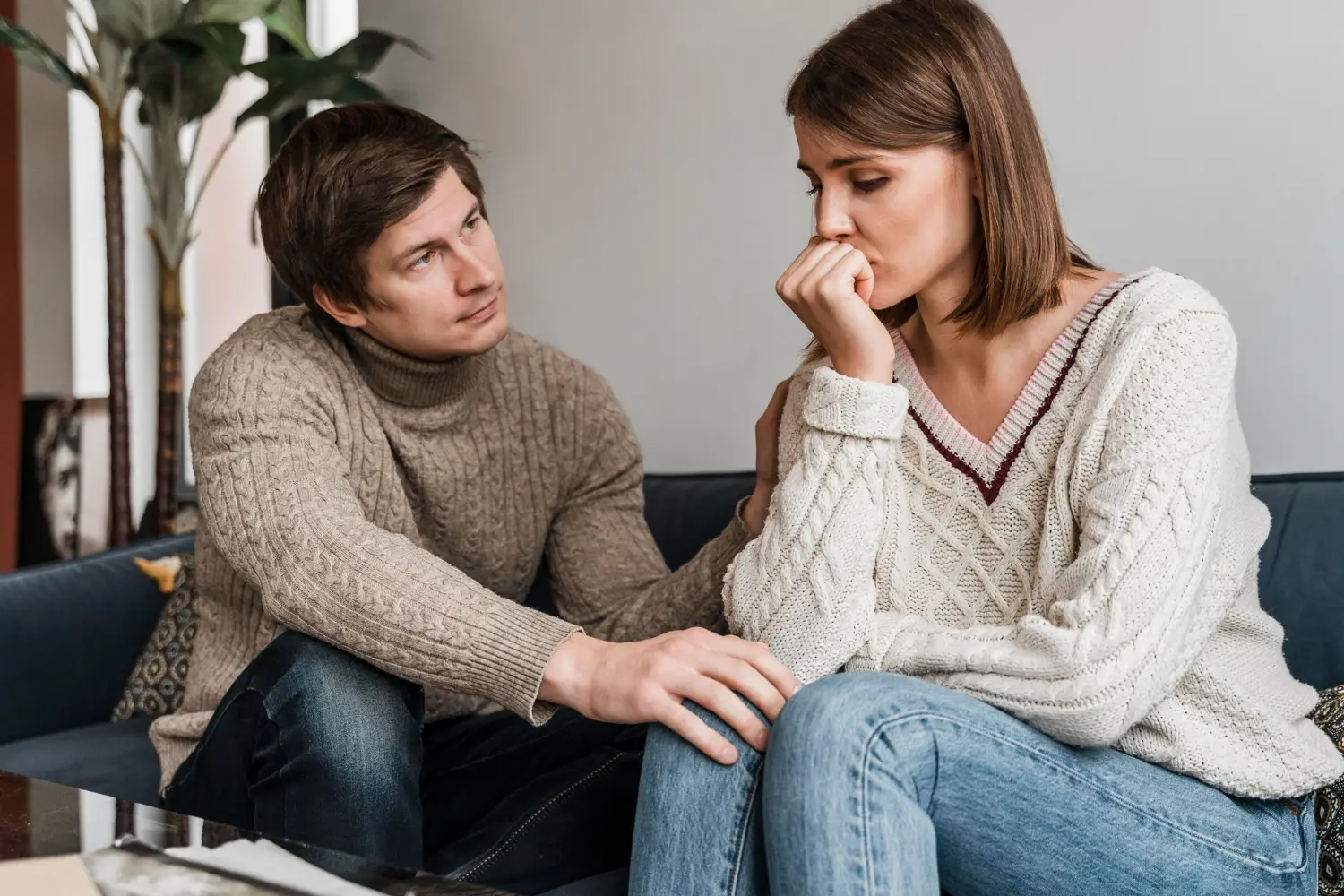How can you possibly feel lonely when you share a bed with someone every night? Saying “I feel lonely” is like saying I feel disconnected”.
Loneliness isn’t measured by time spent alone. Loneliness is about connection, specifically a lack of connection. Therefore, having lots of friends and/or a partner or spouse can leave you feeling lonely if you don’t have a good enough connection with them.
Understanding Loneliness in Relationships
How can you feel lonely in a relationship?
Feeling lonely in a relationship is the result of emotional or psychological disconnection from your partner. Loneliness comes on when we feel our emotional needs are not being met. It’s the sense that we’re not truly seen, heard, or understood by the person who is supposed to be closest to us.
Common Misconceptions About Being Alone vs. Loneliness
Being alone is different from loneliness. “Alone” is a state, meaning you are not with other people. It’s healthy to spend some time alone. Spending time alone is a positive way to connect with ourselves.
“Loneliness” is a feeling. Loneliness is an emotion characterized by feelings of sadness associated with not having a connection.
Being alone doesn’t necessarily create loneliness. You can feel perfectly happy when you’re alone. On the other hand, it’s possible to feel lonely when surrounded by people.
Signs of Loneliness in a Relationship
Lack of Communication
Conversations, especially meaningful topics, are few and far between. On the contrary, conversations with your partner may feel superficial. Communication may be one-sided, with you having to initiate the majority of it.
Diminished Physical Intimacy
Any touch, including physical intimacy, is in low supply. The lack of physical affection reflects a significant disconnection between the two of you.
Reluctance to Open Up
You may feel like you can’t share your thoughts or feelings for fear of being judged or criticized. Even worse, you may feel like your partner simply doesn’t care.
Feeling Alone, Together
You may be sitting in the same room, but it still feels like you are worlds apart. Their physical presence only emphasizes your feeling misunderstood or unseen.
Absence of Shared Interests and Activities
Your partner isn’t feeling like your “go-to person”. Instead, you fill time with other people or your own hobbies. You’re doing most things separately. When you have free time, it tends to be filled independently.
Negative Impacts of Loneliness
Loneliness can cause serious harm to both physical and mental health.
Mental Impacts:
- Mental Health Conditions: Chronic loneliness is associated with depression and anxiety disorders.
- Cognitive Decline: Older adults who feel lonely increase their risk of cognitive decline and dementia.
- Poor Sleep: Loneliness is linked to difficulty falling or staying asleep.
- Increased Stress: Loneliness can increase levels of cortisol in the body.
- Low Self-Esteem: Continual loneliness can lead to negative self-perception and feelings of worthlessness.
Physical Impacts:
- Cardiovascular Health: Loneliness increases the risk of high blood pressure, heart disease, and stroke.
- Decreased Immune System Response: Loneliness can impair immune function, making people more susceptible to illness.
- Inflammation: Persistent loneliness is associated with increased inflammation in the body, which is linked to a variety of diseases, such as cancer or cardiovascular disease.
- Obesity and Poor Lifestyle Choices: Lonely individuals may engage in unhealthy behaviors such as poor diet, lack of exercise, or substance abuse.
- Shortened Lifespan: Studies suggest that the harm from loneliness is comparable to smoking 15 cigarettes a day and can therefore increase the risk of early death.
Causes of Loneliness in a Relationship
Loneliness in a relationship is often attributed to problems within the relationship. Anything that hinders you from having a strong connection with your partner can be a cause of loneliness.
Unrealistic Expectations
Not only do we crave a strong connection, but we expect our spouse to fulfill every one of our needs. This is a big ask when your spouse is just one person. There’s an expectation for them to satisfy multiple roles. We want our spouse to be our best friend and lover. And we might also expect them to be the caretaker, the motivator, the entertainer, the intellectual, the breadwinner, the perfect parent, and more. In other words, we might expect them to be our everything. When we set unrealistic expectations, we set ourselves up to be disappointed. Some people are simply more sensitive to feeling lonely and require more to keep the feeling of loneliness at bay.
Codependency Issues
A codependent partner focuses only on pleasing the other person. Codependency prevents a real connection.
Signs You Have Codependency Issues:
- You feel anxious or empty when your partner doesn’t need you.
- You don’t express your needs to your partner because you don’t want to “burden them”.
- You feel unfulfilled even though you’re putting in all the work in the relationship.
- You’re constantly trying to fix or save your partner.
- Your self-worth depends heavily on how your partner treats you
- Your mood is dependent on your partner’s
Unmet Needs
A lack of emotional intimacy is a big reason why someone may be feeling lonely in a relationship. Emotional intimacy involves being truly heard, understood, or validated. If this need isn’t met, you can feel profoundly alone.
Other unmet needs that can lead to loneliness:
- Physical closeness and intimacy
- Respect for boundaries and personal space
- Share interests
- A sense of being a priority in the relationship
Your partner not recognizing your love language may be the reason why you have unmet needs. If your partner doesn’t express love in the way you best receive it, you’re bound to feel unsatisfied even if they think they’re showing love.
Strategies to Overcome Loneliness in a Relationship
Communicate, Well
To combat loneliness, communication is paramount. Talk often and honestly. This means sharing your feelings. Express your feelings without putting blame on your partner. Use “I” statements. For example, “I’ve been feeling distant. I miss feeling close to you.”
Ask your partner what their thoughts are and if they’ve been feeling similarly. Let your partner know how they can meet your needs. Be direct, but kind. Tell your partner what things they already do that make you feel loved so that they can do more of them. Remove any guessing or assuming they can read your mind.
Focus on Emotional Intimacy
Emotional intimacy doesn’t get the hype that physical intimacy does. But emotional intimacy is what builds true connection. Emotional intimacy is a closeness between partners where both people feel safe, secure, and free to be their true selves. Without emotional intimacy, there is an obvious disconnect between partners.
Give Affection
Physical intimacy is closely tied to emotional intimacy. Don’t forget the smaller ways to show affection, like gentle touching, massaging, cuddling, or holding hands.
Show Appreciation and Gratitude
Small, unexpected acts of love show your partner you care. Leave them a thoughtful note. Get them a meaningful gift. Give them a massage. Do something that lightens their load.
Be Fully Present
Remove distractions. Give your partner your full attention when spending time together. Don’t let technology impede your connection. Glancing at your phone can make it seem like what’s on your screen is more important than what they have to say. It can give the impression that you’d rather be elsewhere.
Have Fun Together
Remember being playful and flirty? Bring it back! Remember to have fun with your partner. Date your spouse, woo your partner.
Try Something New
Plan a spontaneous mini-trip with your partner. Do something neither of you has done before. Or enter their world and ask to join in on a hobby or activity you know your spouse enjoys.
Schedule Time to Connect
Be more intentional when it comes to building your connection with your partner. Plan it out. Whether you make it a daily or weekly habit, create a ritual you can rely on. It could be an evening walk together or a weekly date out of the house, for example.
Do Something
Don’t wait for your partner to read your mind and make you feel less lonely. Take action. Plan out something that both of you can do together that will make you feel closer to them. Simply ask, Can we spend some time together?” See what ideas they have. If you’ve been feeling disconnected, there’s a chance they have been feeling similarly.
Building Personal and Social Connections
Sometimes, feeling lonely in a relationship is the result of unrealistic expectations. If you expect your partner to be everything for you, you will end up dissatisfied and undeniably lonely. Your partner cannot fulfill your every emotional need.
The only person who can truly meet your emotional needs is you. Relying on anyone else to fill your emotional cup will likely lead to disappointment and possibly resentment. If you lack outside connections, build social connections through community activities.
It’s important to have people outside of your partner, friends, or family members who support you in different ways. But ultimately, happiness and contentment can only be found within yourself. Learning how to mentally care for ourselves is much harder than it sounds. Therapy is a great way to help you find contentment within. Self-care habits, like journaling, yoga, and meditation, are ways to regulate ourselves and know ourselves better.

 Call Us Now
Call Us Now



